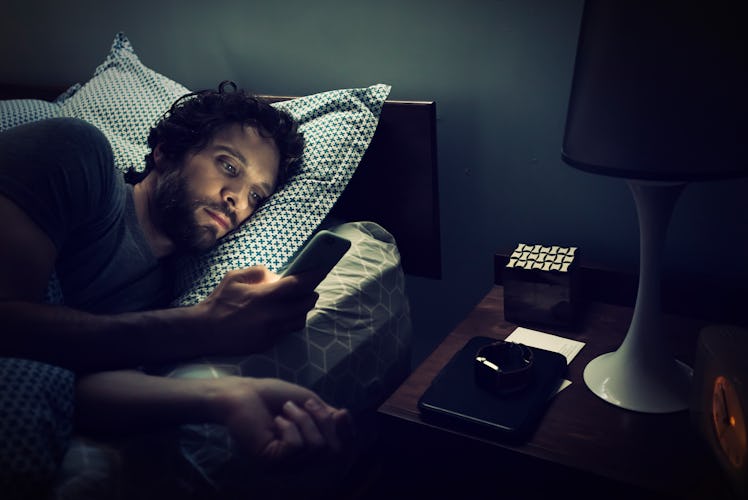This Study Will Break Your Habit Of Checking The Clock When You Can’t Sleep
Put your phone out of reach and thank us later.

We’ve all been there — lying awake in the middle of the night, staring at the clock, doing mental gymnastics to figure out how much sleep we’ll get if we could just fall asleep right that second. It’s a frustrating, if familiar, scenario, and it’s one that actually worsens your insomnia. And, in a new study, researchers from Indiana University recently discovered that clock-watching is not only associated with worsening insomnia but also increased use of sleep aids.
Insomnia affects between about 4% and 22% of adults and has been linked to chronic health conditions such as depression, diabetes, and heart disease. Luckily, one small but significant change might make all the difference in getting a good night’s sleep: That’s right, quite checking the time. It’s really that easy.
The research team, led by Spencer Dawson, Ph.D., a professor of psychological and brain sciences at Indiana University, surveyed nearly 5,000 patients who sought care at a sleep clinic. Participants answered questions regarding the severity of their insomnia, behavior during insomnia episodes, use of sleep aid medications, and previous psychiatric diagnoses. Results were published in the journal The Primary Care Companion for CNS Disorders.
“People are concerned that they’re not getting enough sleep, then they start estimating how long it will take them to fall back asleep and when they have to be up,” Dawson explained. “That is not the sort of activity that’s helpful in facilitating the ability to fall asleep — the more stressed out you are, the harder time you’re going to have falling asleep.”
The researchers found that checking the clock makes insomnia worse, which leads to an increased use of sleep aids because as time passes, concern about the amount of sleep you get grows and increases the likelihood that you’ll use a sleep medication to help you break the insomnia cycle.
But sleep aids are bad for your health too. Using over-the-counter antihistamines for sleep increases the risk of cognitive decline and possible dementia, and prescription sleep meds are linked to a range of conditions, including Alzheimer’s, cancer, psychiatric disorders, and even death.
However, if it’s 2 a.m. and you have to be up in five hours — and you’re trying to avoid the risks linked to sleep aids (or just don’t have any ZzzQuil or Ambien in the house) — what can you do?
Simply take away your ability to check the time. “One thing that people could do would be to turn around or cover up their clock, ditch the smart watch, get the phone away so they’re simply not checking the time,” Dawson said.
The researchers noted a few limitations to the study. All data were self-reported, including psychiatric diagnoses, and questionnaires did not include questions regarding medication availability and attitude towards medication use. Further research is needed to determine whether decreasing clock-watching or time-monitoring behavior decreases insomnia over time.
Other experts say that if you’re struggling to fall asleep, particularly if you’ve been in bed for more than about 20 minutes (not an exact measure since you’re not checking the clock!), you should try a change of scenery. Get out of bed so that you can keep your association as bed as a place where sleep happens. Then do a calming activity that doesn’t require screens, such as reading a book. Once you start to feel tired, you can do back to bed, and you’ll be asleep before you know it.